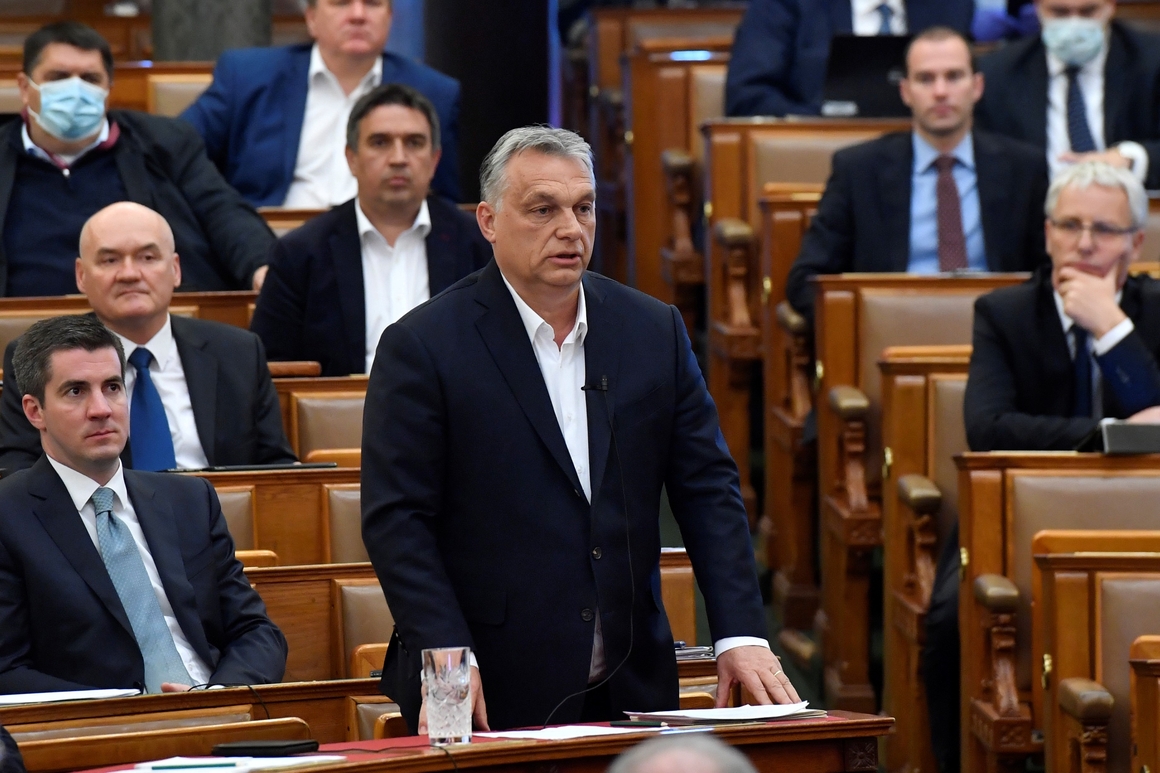
In Berlin, about 1,000 people — among them far-right activists and conspiracy theoretics — attended an illegal rally against the lockdown on Saturday.
In general, however, far-right parties that have grown at the ballot box and at the local level in recent years on a wave of populism in Europe have failed to respond with much unity or conviction to the strange spectacle of EU governments ordering the kind of border closures and anti-migration controls that they only imagined in their wildest dreams.
While far-right parties, which are mostly in opposition, are largely struggling to find a coherent message on the virus and, in some cases, falling in opinion polls, mainstream parties in government benefit from the „rally ’round the flag“ effect seen in times of crisis.
This is also true for nationalist, right-wing parties that are in government, such as in Poland and Hungary where they have gained support — in Hungary’s case despite a controversial power grab by Prime Minister Viktor Orbán.
Early in the crisis, some European right-wing opposition parties tried to use the pandemic to stoke fears of immigration, warning that asylum seekers would bring the virus to the EU. That argument failed when it emerged that Europe itself was becoming a global coronavirus hot spot, with considerably more cases than Africa, for example.
In Germany, the Alternative for Germany (AfD) initially took a page out of Trump’s playbook by downplaying the risk of the virus: AfD lawmaker Axel Gehrke, who was the party’s spokesperson for health policy until he left the position in October due to illness, wrote as recently as late March in a blog post that the coronavirus was „demonstrably milder than influenza viruses,“ and spoke of the „gigantic FAKE of the year.“
But such positions proved unpopular with the German public, which largely backs the government’s precautionary response to the virus, and also within the AfD some influential lawmakers pushed for taking the risk of the virus more seriously.
In early April, the party adopted a position paper, this time criticizing the government for having reacted too late to the pandemic. The paper argued that earlier actions by authorities could have avoided the need for a shutdown and criticized the „massive interference in fundamental rights.“
The AfD has paid for its wavering response, losing about 4 percentage points since the beginning of the year and now trailing at around 10 percent, its lowest popularity rate in two and half years.
In other EU countries, right-wing parties face similar problems: Spain’s Vox has lost about 2 percentage points in polls since the beginning of the year and is now at roughly 14 percent, though it narrowly remains the third political force.
Vox has positioned itself clearly in opposition to the governments’ lockdown measures, labeling Fernando Simón, the scientist in charge of Spain’s emergency response, a „psychopath,“ and filing a lawsuit against the government for attempting to stifle basic human rights during the crisis.
In Italy, while approval ratings for Prime Minister Giuseppe Conte have surged as high as 71 percent for his handling of the crisis, the far-right League has lost about 4 percentage points since the beginning of the year, though it would still come first if an election were held tomorrow.
But that hasn’t discouraged the League and other far-right groups, including neo-fascists like Forza Nuova and Casapound movement, from their antagonistic approach to the government in a time of crisis.
Simone di Stefano, one of the leaders of Casapound, told POLITICO his group supports a proposed boycott of a coronavirus contact-tracing app, Immuni, which the government is testing to control the spread of the disease.
„[It] is an unacceptable infringement of individual liberty,” di Stefano said.
Far-right parties in Europe are not all pushing against the lockdown restrictions: In the Netherlands, where the government chose a much more relaxed approach by closing bars and restaurants but keeping shops open, they have taken the opposite tack.
Thierry Baudet, leader of the populist Forum for Democracy, and Geert Wilders, leader of the far-right PVV, have criticized the government for being too lax and Wilders even accused Prime Minister Mark Rutte of “playing Russian roulette” with the health of the Dutch public.
Across the border in Belgium’s Dutch-speaking region of Flanders, the far-right Vlaams Belang had been on a roll, after coming second in a regional election last year. Now it is isolated, without a voice in the debate, after all other parties but Vlaams Belang and the extreme left decided to back the Belgian minority government’s pandemic response.
“We support the measures that are necessary to tackle the immediate health crisis, but remain a critical voice,” Vlaams Belang leader Tom Van Grieken told POLITICO. “Parliament shouldn’t be sidelined because of this crisis. Given Belgium has the highest death toll per capita, there are definitively critical questions to be asked.”
Some right-wing groups, including Italy’s League and France’s National Rally, have resorted to the tried and trusted tactic of blaming the European Union — in this case, for failing in its response to the worst health crisis to hit Europe in a century and for lacking solidarity with the worst-affected member countries, namely Italy and Spain.
„The EU is proving to be totally powerless,“ said Nicolas Bay, head of the National Rally’s delegation to the European Parliament. „The Commission could have anticipated [this crisis]. It had the tools at its disposal, it was informed and did not do anything about it.“
Bay argued that the current measures taken by the EU to solve the Coronavirus crisis offer „little added value.“
Speaking during a European Parliament debate last week, European Commission First Vice President Frans Timmermans accused the Euroskeptics of hypocrisy.
„Let me point to a certain form of irony: Those who have strong reservation against the European project in general, who would have cried havoc had the European Union ever considered wanting to take up competences in the field of health care, and who would have resisted that with all means, they are now crying havoc that Europe isn’t acting in this field,“ Timmermans said.
Where the far right has historically been able to gain traction, however, is in popular discontent during times of economic hardship and mass unemployment — and Europe is heading into an economic downturn of historic proportions in coming months, as a direct result of the measures taken to stop the spread of the virus.
With the International Monetary Fund already forecasting a 7.5 point contraction for the eurozone, right-wing parties may find an opening by seizing on Europeans’ inevitable anxiety about the very real prospect of companies failing and economic hardship.
In Germany, the AfD is now trying to position itself as the voice of people who worry about the economic havoc possibly more than they fear for public health.
„We need to discuss the question of when measures against the pandemic will start to cause more damage than the pandemic itself,“ Alexander Gauland, one of the two leaders of the AfD’s political group in the Bundestag, told the parliament on Thursday.
The group’s deputy leader Sebastian Münzenmaier urged the government to immediately open restaurants, hotels, shops, theaters and other public places, provided these establishments can guarantee the necessary social distancing.
„Every day, desperate citizens come forward, begging us and especially you [the government] for a relaxation of measures so that they can try to save their once thriving businesses and companies,“ he said in parliament. „Give the many hard-working people in this country finally a perspective again.“
Additional reporting by Kalina Oroschakoff, Eline Schaart, Cornelius Hirsch, Hannah Roberts and Aitor Hernández-Morales.
Source: politico.com
See more here: news365.stream





